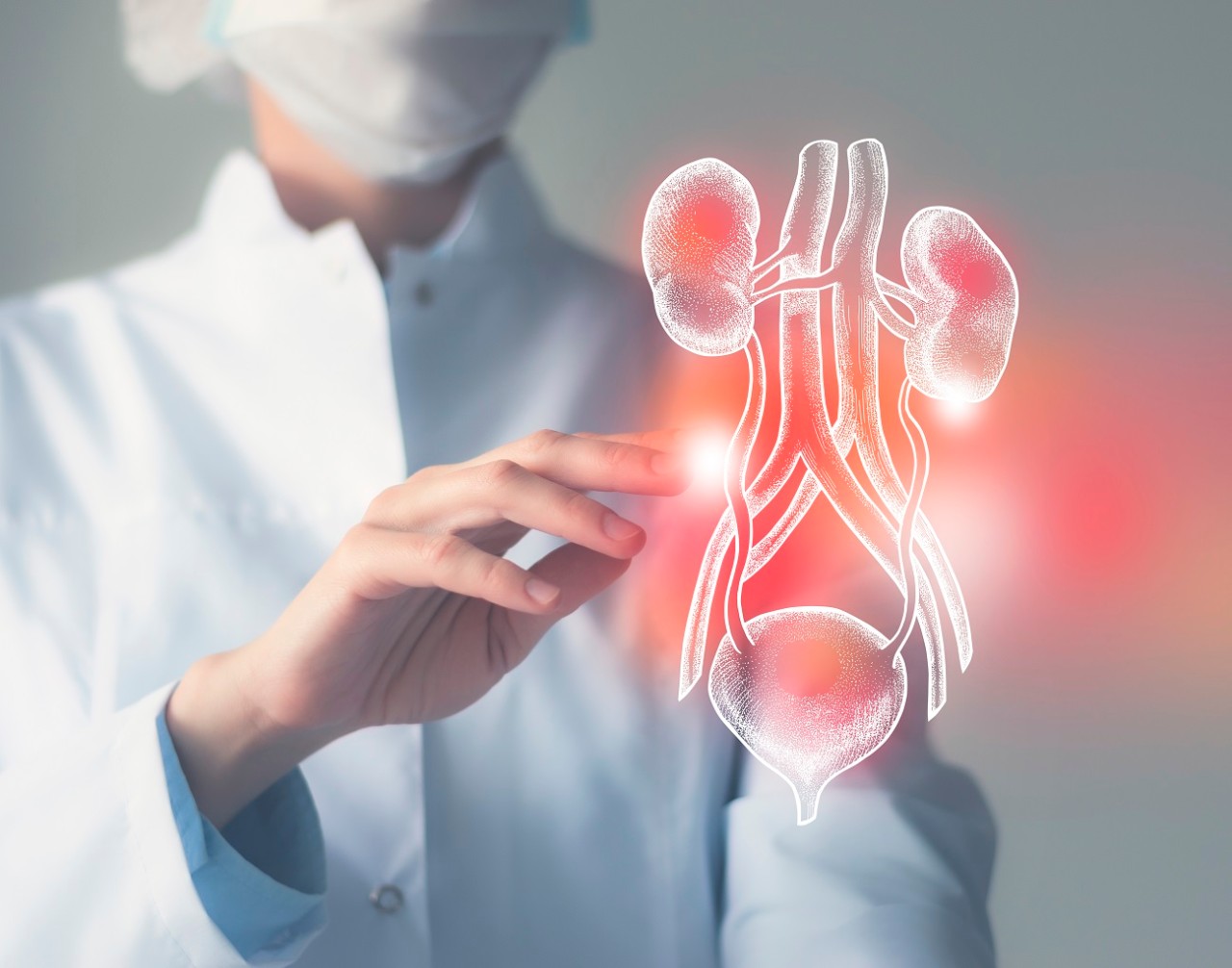
Urology Residency
The Virginia Mason Section of Urology began its own ACGME-accredited residency program in 2014. Prior to that, it had a 50-year track record of training Virginia Mason clinical fellows, as well as urology residents from the University of Washington and Madigan Army Medical Center.
The Virginia Mason urology residency program is committed to providing our residents with sound training such that they can be fully prepared to pursue careers in either clinical urology or academic medicine. The program is a 5-year program, including the intern year during which the resident spends 6 months on urology and 6 months on carefully selected general surgery rotations. Residents will be deeply immersed in all facets of urology, ranging from oncology and pelvic floor reconstruction to transplantation, pediatrics, and stone disease. Training will include the breadth of endoscopy, minimally invasive surgery (laparoscopy and robotics), and simple and complex open cases.
The education will encompass the six Core Competencies as deemed by the ACGME
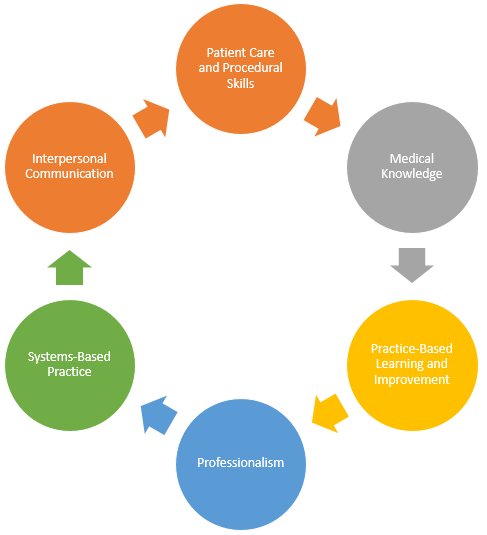
Virginia Mason Urology residents will have the opportunity to participate in clinical research projects through faculty that are engaged at the local and national level of their subspecialty fields. A unique strength of this residency is the deep-seated camaraderie amongst the residents, and the tight-knit community of the Section of Urology and Virginia Mason Medical Center (VMMC) as a whole.
While residents will be carefully and attentively guided through their training, they will be expected to have graduated responsibility as they mature in their clinical and surgical skills and knowledge base.
The Mission of the Urology Section
The mission of the Virginia Mason Franciscan Health Urology Residency is to develop compassionate, skilled, and collaborative urologic surgeons who are models of excellence and integrity in their health care communities.
Residency Training Program
Post-graduate year 1
Residents will start their training as a categorical urology intern and spend half their time on the VMMC Urology Service and the remaining time performing general surgery internship rotations that include vascular surgery, gynecology, hepatobiliary surgery, critical care, emergency medicine, and thoracic surgery. During their time on urology, interns will be managing the floor, but they will also be routinely assigned to cover junior level surgical cases. They will also begin to learn clinical urology and start covering daytime urologic consults under the guidance of the chief residents.
Sample PGY1 Rotation Schedule
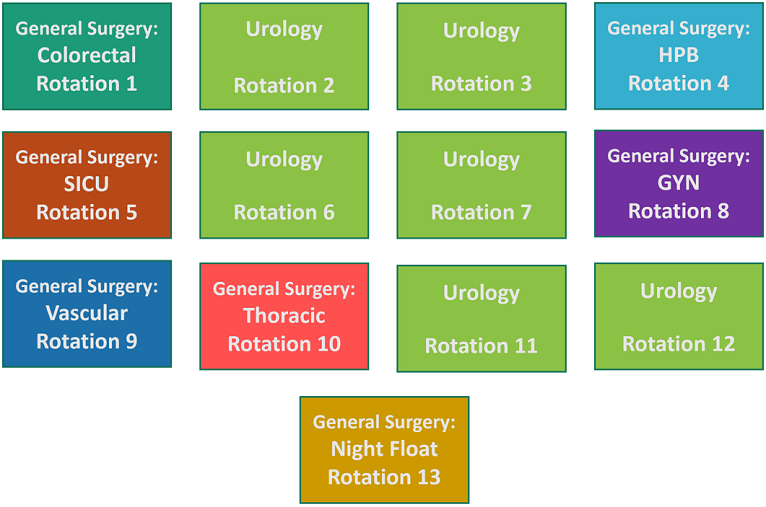
Post-graduate year 2
The second year in urology is based entirely at Virginia Mason. This year focuses heavily on endoscopic surgery (encompassing treatment of stones, urinary tract tumors, and benign prostatic hypertrophy) as well as junior level open cases. Additionally, residents will start covering major open cases such as scheduled kidney transplants and will cover cases that come in while on call. Transplant surgery is a unique opportunity that few urology programs offer and provides residents early exposure to both urologic and vascular reconstructive techniques that are applicable throughout the remainder of training.
During the second year, residents will be assigned specific clinic days, during which they will work with different attendings to learn how to take a proper urologic history and perform a GU-focused physical examination, complete an appropriate diagnostic evaluation, and formulate a sound treatment plan. Residents will also be exposed to diagnostic testing, including office cystoscopy, ultrasound, prostate needle biopsies, and urodynamics.
Sample PGY2 Rotation Schedule
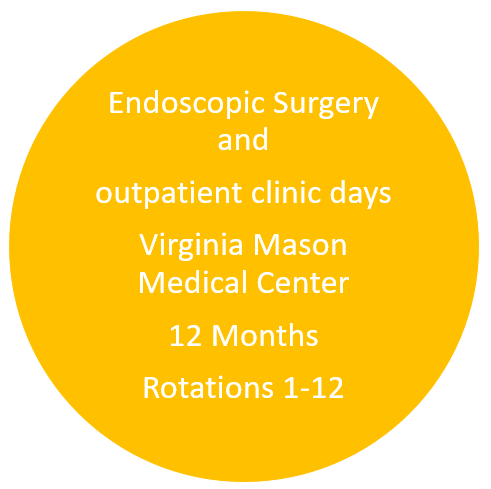
Post-graduate year 3
The PGY3 year is the first year that residents leave Virginia Mason Medical Center. The year starts with a 3-month rotation at the Madigan Army Medical Center (MAMC) located outside of Tacoma, approximately 45 miles from Virginia Mason. Some residents choose to commute on non-call days, however, on call days, residents must spend the night near MAMC. Virginia Mason offers a significant additional stipend (currently $1650/month) for residents to secure additional lodging in Tacoma. The MAMC rotation provides an opportunity to gain exposure to a busy general urology service in a different hospital system with a unique patient population.
The PGY3 year continues with 6 months of combined research and clinical activities with exposure to some of our ambulatory and outpatient surgery centers. The expectation is that each resident submit a minimum of one manuscript for publication by the completion of this rotation.
The year then ends with a short commute to the Swedish Medical Center (also located in the First Hill neighborhood two blocks from Virginia Mason) for a 3-month pediatric urology rotation under an apprenticeship model (one resident to two attendings) in a high-volume pediatric urology practice. Residents work closely and exclusively with two attendings to gain concentrated exposure to fundamental pediatric urology concepts and practice.
Sample PGY3 Rotation Schedule
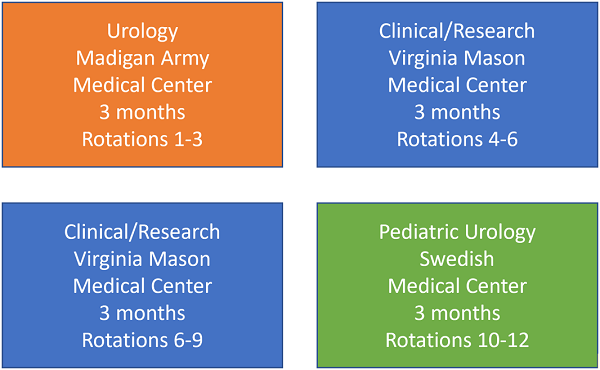
Post-graduate year 4
There are four 3-month rotations in the PGY4 year. Residents start at Virginia Mason for a rotation specifically focused on FPMRS, prosthetics, and genitourinary reconstruction, where they will gain exposure to male and female voiding dysfunction and pelvic floor reconstruction, neurourology, prosthetics (including inflatable penile prostheses and artificial urinary sphincters).
The second R4 rotation is at Tacoma General Hospital (~35 miles from Virginia Mason), where residents gain exposure to acute care/trauma and oncology. This rotation is highly valued by the residents for the significant robotic surgery volume, and again there is an additional financial stipend for local housing support.
The residents then return for their final 3 months of pediatric urology at Swedish Medical Center, this time as senior residents. Following that, they complete the R4 year with an additional 3 months at Tacoma General, where their robotic surgery skills are further refined.
Sample PGY4 Rotation Schedule
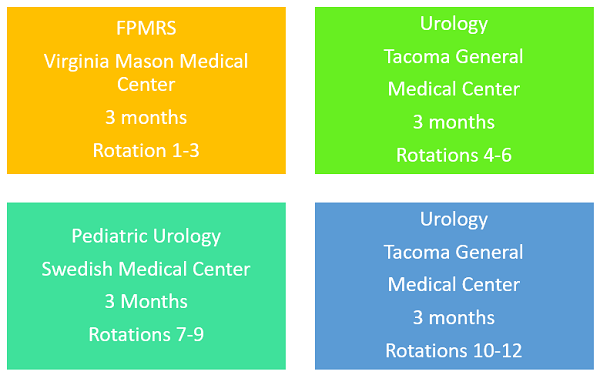
Post-graduate year 5
During the resident’s PGY5 year they return to Virginia Mason as the chief resident of the urology service. This training focuses heavily on laparoscopic, robotic, and complex open oncologic cases, in addition to continued exposure to FMPRS, prosthetics, diversions and transplant surgery. As the chief resident, the R5 is responsible for managing the heavy operative volume, overseeing the care of the inpatient urologic service, supervising the junior residents (Virginia Mason and visiting Madigan residents), and running the administrative aspects of the service.
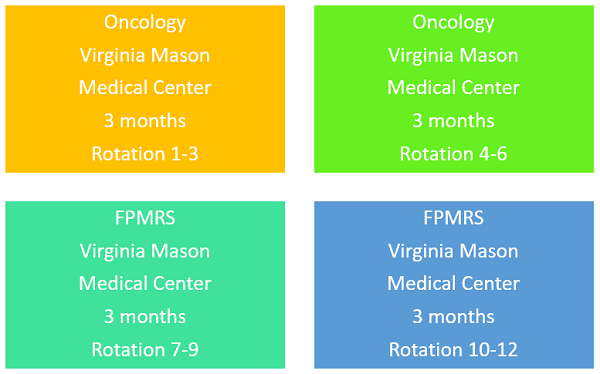
Fellows
Virginia Mason has a 2-year fellowships, an ACGME-accredited FPMRS fellowship. The residents work closely with the fellows and have ample opportunity to learn from them and participate in research projects with the fellows, if they are interested.
Conferences
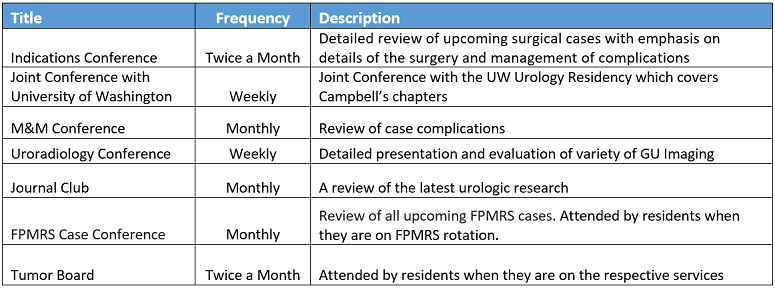
Medical Students Rotations
Virginia Mason offers observerships and clerkship experiences for all levels of training in a variety of fields. Only currently enrolled students will be considered.
Fourth Year Inpatient Medical Student Clerkship Rotations
Four-week clerkship inpatient elective rotations in anesthesiology, diagnostic radiology, internal medicine, general surgery, and urology are offered to currently enrolled fourth year medical students who are interested in careers in one of these five fields of medicine. These clerkships serve mainly as a teaching experience with any "service" function being incidental. Fourth year medical students must apply to these clerkships via a formal application process.
- Applications will be accepted in April
- Applications will be reviewed starting May 1. Please note that you have not been accepted for an elective until you receive a letter of approval from Virginia Mason Graduate Medical Education.
